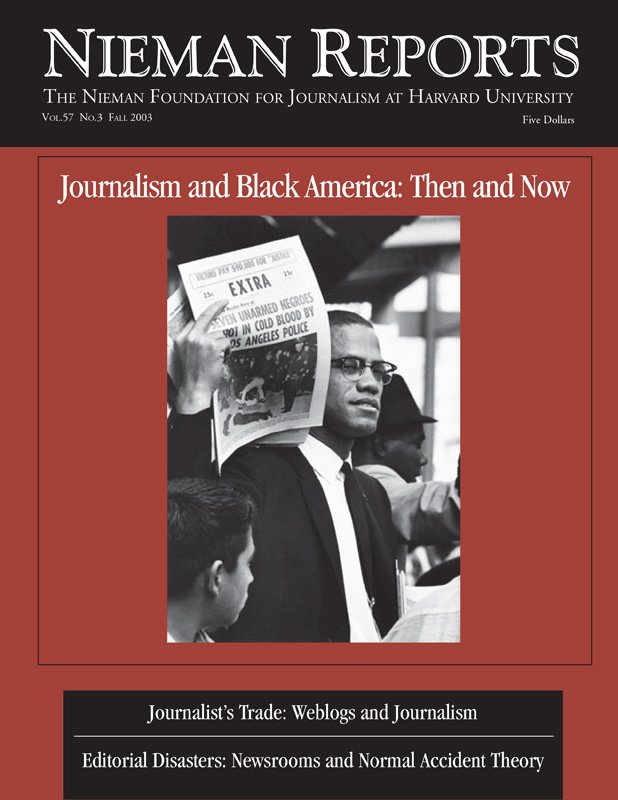Pushing the envelope. Weblogs are helping to expand the boundaries of experimental forms of transaction journalism. Freelance journalist Christopher Allbritton, a former reporter for The Associated Press, asked his Weblog readers to finance a trip to Iraq at the outbreak of hostilities there. Some 320 people donated more than $14,000 and helped him launch Back-to-Iraq.com. His readers then served as his editors during three weeks of dispatches during which Allbritton broke news on the fall of Tikrit and highlighted the Balkan-style ethnic tensions among Kurds, Arabs, Turkomen and Assyrians. Similarly, freelancer David Appell, a physics PhD who has written for Nature, asked his readers to donate $20 apiece to fund his investigation of the politics of the sugar industry. He wrote a report after raising $425.
Influencing at the edges. We see sentiments first expressed on Weblogs bubble up into the mainstream media days or weeks after they first surface in the blogosphere. Similarly, all too often the mainstream media tend to dispose of stories in a fast-paced news cycle, with even important news events falling off their radar screen after 48 hours. Bloggers say, hold the phone, we’re not done with this yet. Blogs keep stories alive by recirculating them and regurgitating them with new angles, insights and even newsworthy revelations. Weblogs were credited with helping to get the mainstream news media interested in the racially insensitive remarks by Senator Trent Lott that led to his resignation as Senate majority leader.
Enhancing reader trust. News organizations such as MSNBC, The Providence Journal, The Dallas Morning News, and The Christian Science Monitor have embraced the Weblog form in some part of their editorial operations. These news organizations realize that Weblogs offer an opportunity for newsrooms to become more transparent, more accessible, and more answerable to their readers.
Independent journalists and pundits such as Andrew Sullivan, Doc Searls, and Joshua Marshall have found that publishing a Weblog increases their authority and credibility in the eyes of readers. Time magazine media critic James Poniewozik described the perception gap between the audience and the media about trust this way: “Journalists think trust equals accuracy. But it’s about much more: passion, genuineness, integrity.” Weblogs and a commitment to open dialogue instill trust in the relationship between news media and audience.
Repersonalizing journalism. Blogs present a vehicle for expressing thoughts and reportage that doesn’t always fit the contours of a traditional news report. Television reviewers have begun blogging their experiences with network executives and Hollywood stars during the annual summer Television Critics Association press tour in Los Angeles. Political writers are using blogs to bring daily commentary to the campaign trail. But more important, blogs offer an opportunity for readers to hear a journalist’s voice and personality. Newsroom-sanctioned Weblogs promise to show journalists as human beings with opinions, emotions and personal lives—and yes, with warts and foibles. Weblogs could usher in a refreshing new openness in newsrooms by attaching a face and personality to reporters. Blogs could show that newspapers aren’t monolithic corporations but a collaborative team of individuals with varying viewpoints and who have more in common with their readers than they could possibly know from reading their print articles alone.
Fostering community. When journalism becomes a process, and not a static product, audiences discard their traditional role as passive consumers of news and become empowered partners with a shared stake in the end result. Weblogs offer one way to promote that kind of interactivity.



